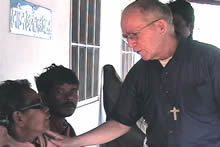
When he heard the call, George Pope answered. He was a young man, and when a priest at Notre Dame made his pitch for the Holy Cross missions in Bengal, Pope took the words to heart. He graduated from the University in 1954, joined the Congregation of Holy Cross and arrived in Dhaka in November 1958. He would spend 44 of the next 46 years of his life in the place now known as Bangladesh.
Tucked beneath northeastern India, Bangladesh is a tragically flood-prone tropical country. Some 140 million people live there —that’s equivalent to more than half the U.S. population residing in an area about the size of Iowa. Only about 200,000 of these are Catholic; the rest are mostly Muslim and Hindu. Bangladesh, Pope points out, “is the poorest country on Earth. It experiences many natural disasters such as killing cyclones, tidal waves and unbelievable floods. We also have human violence, including the awful chaos of civil war and heart-wrenching epidemics.”
The CSCs have been there for 150 years. In order to get official recognition from the Vatican, the Congregation’s founder, Basil Anthony Moreau, CSC, agreed to send the first missionaries to East Bengal in 1853 (a decade after another Holy Cross missionary, Edward F. Sorin, was sent from France and founded Notre Dame). Five years later Moreau would write: “I have been blamed by some for accepting this Mission, on the ground that all the other Congregations had refused it and that no good can be done there.”
But much good has been accomplished. Holy Cross fathers, sisters and brothers operate two colleges there as well as high schools, village schools, technical schools and a street academy to give homeless children a basic education and job training. CSCs staff parishes and run student hostels, serve at clinics, leprosaria and hospitals. They have successfully developed vocations from among the native Bangladeshi. Of the 185 professed Holy Cross religious now working in Bangladesh only about 25 were born outside the country, and the seminaries there are full.
The intent these days is not to convert but to serve. In his first 20 years in Bangladesh George Pope did just that. He traveled through the jungle, village to village, on foot, horseback and motorcycle, ministering to Muslim and Christian alike, including the Garos and other tribes who make up half the Catholic population of Bangladesh. “Only one-fourth of 1 percent of its people are Christian, and 90 percent are Muslim,” says Pope. “In that situation you can’t make converts. You simply try to meet human needs, and here these needs are continuous and many.”
In 1964, when Muslim refugees sought to drive the Garos from their lands, burning villages to the ground, the priest tried to intervene. Clubbed on the head with the butt of a rifle, he recovered in time to narrowly dodge a bayonet thrust. He spent several days in captivity before another priest, citing Pope’s U.S. citizenship, got him freed.
Pope returned to the States in 1979, got some needed rest and worked toward an advanced degree in psychology. But in 1981 he was back, this time teaching at the National Major Seminary in Dhaka. For more than 20 years he has helped run the Nevin Medical Center at Notre Dame College in the Bangladesh capital where the vast majority of its 13 million people are desperately poor. It shelters 30 people at a time and treats others afflicted with tuberculosis, cholera, typhoid, malaria and various infections as well as pregnant women in need of care. Pope’s efforts to get the more serious cases into one of the 15 local government hospitals often require out-maneuvering the blockades of red tape or the local labyrinth of bribes.
Pope’s personal contacts and his backdoor knowledge of the area’s medical community have helped the priest serve the sick, offer them prayers and supply them with much-needed medicines that are often in short supply. His calm way has made him a welcome caregiver in a place of friction and desperate need. “He was a quiet boy but by no means an introvert,” says Pope’s sister Joyce Riggio. “I have never heard of any mean action that could have been attributed to him. He was always very observant and sensitive, very sensitive to the feelings and needs of anyone with whom he came in contact. He is the kindest person I have ever known.”
In November 2003 the priest, who was 74 at the time, was scooting around on a motorcycle in Dhaka when he crashed his bike. A broken leg, dislocated shoulder and the rehabilitation for those injuries put him in the hospital for four months. He became a recipient of the kind of attention and care he’d been giving to others for decades.
“You may wonder why I became a missionary,” he recently said during a sermon. “Well, at Notre Dame the more I learned about Jesus’ gift of himself, the more I wanted to return his love by sharing it with others in the foreign missions.” George Pope heard the call when he was a college student. Now, 50 years later, he is still answering it.
Henry Mayer, a lifelong friend of Father Pope, lives and writes in Louisville, Kentucky. The photo of Father Pope is from the author.